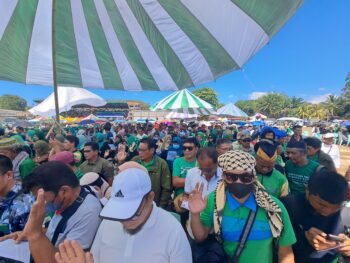COTABATO CITY (MindaNews/28 October) — Describing the present electoral system as “very divisive” to the point that “families are splitting up,” Mohagher Iqbal, chair of the Moro Islamic Liberation Front (MILF) and of the Bangsamoro Transition Commission (BTC), the body tasked by the government and MILF to draft the Bangsamoro Basic Law, said the new electoral system mulled for the future Bangsamoro must address these concerns.
“We will decide that in the BTC,” Iqbal told MindaNews in a text message.
The Framework Agreement on the Bangsamoro (FAB) signed on October 15, 2012, provides for the creation of a new autonomous political entity called the Bangsamoro, to replace the 23-year old Autonomous Region in Muslim Mindanao by June 30, 2016.
The FAB provides that the government of the Bangsamoro shall have a ministerial form and that they would “entrench an electoral system suitable to a ministerial form of government.”
“The electoral system shall allow democratic participation, ensure accountability of public officers primarily to their constituents and encourage formation of genuinely principled political parties. The electoral system shall be contained in the Bangsamoro Basic Law to be implemented through legislation enacted by the Bangsamoro Government and correlated with national laws,” the FAB said.
Before the new electoral system is entrenched, however, the first hurdle is still the plebiscite for the Bangsamoro Basic Law which will be held under the current electoral system immediately after its passage before end of 2014.
In his State of the Nation Address (SONA) on July 22, Aquino called on Congress to pass the Bangsamoro Basic Law before yearend 2014.
“Maipasa po sana ninyo ito bago matapos ang 2014. Sa gayong paraan, may sapat tayong panahon para makapaghanda sa paghalal ng bagong pamahalaang Bangsamoro sa 2016” (I ask you to pass the Bangsamoro Basic Law before the end of 2014. This way, we will have ample time to prepare for the election of a new Bangsamoro government come 2016).
According to the FAB, upon promulgation and ratification of the Basic Law, the ARMM is “deemed abolished” and all devolved authorities are vested in the Bangsamoro Transition Authority (BTA) during the interim period.
The FAB adds that the ministerial form and Cabinet system of government shall commence once the Bangsamoro Transition Authority is in place. The BTA “may reorganize the bureaucracy into institutions of governance appropriate thereto.”
MILF chair Al Haj Murad Ebrahim told MindaNews days after the May 2013 elections that they considered that election as “a testing ground” for the MILF because “officially, we did not participate in the elections. We were just gauging.
But part of the “testing,” Murad said, was that the MILF last year encouraged its members to register during the general re-registration in the Autonomous Region in Muslim Mindanao. It also urged the registered voters among its members to vote for candidates supportive of the peace process.
“We did not endorse a candidate so we gave members free will on who they want, who can help in the peace process. Not everyone in the MILF voted because there are those who are not registered voters,” Murad said, adding that they encouraged members to “register in preparation for the plebiscite.”
Murad also said the MILF was going to create a political party starting this year.
“We are more inclined to form a political party because we want to maintain the status of the MILF as an Islamic organization. We are more inclined to form a political party that will be the arm of the MILF for the political process,” Murad said in May.
The political party Murad said they would set up “starting this year” apparently has not been set up. Iqbal said the MILF did not participate in the October 28 barangay elections which is supposed to be crucial for the MILF in preparation for the plebiscite on the Bangsamoro Basic Law because the election is “very divisive” and “families splitting up.”
Clan politics is pervasive in the predominantly Moro areas.
The government and MILF peace panels last month discussed in their negotiations on power-sharing, the ministerial form of governance of the future Bangsamoro. Part of the discussions included how many seats the Bangsamoro Assembly will have and how the representatives to the Assembly will be voted: Would it be based on the existing legislative districts? Would it be by proportionate representation? Would it be mixed?
Details on the manner of elections will be crafted by the 15-member GPH-MILF Bangsamoro Transition Commision as soon as the Annex on Power-Sharing is approved and the Comprehensive Peace Agreement is signed.
Two Annexes to the FAB are still to be signed to complete the Comprehensive Peace Agreement: the Annex on Power-Sharing and the Annex on Normalization.
Two other Annexes had earlier been signed: the Annex on Transitional Arrangements and Modalities in February and the Annex on Wealth-Sharing in July.
Under the FAB, the GPH and MILF agreed to finish all four annexes before yearend 2012. (Carolyn O. Arguillas / MindaNews)
